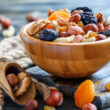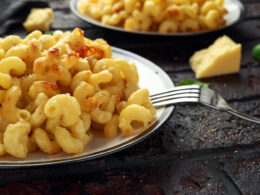Trying to cut down on sugar? Maybe you’ve heard all the health warnings from doctors and government officials, or maybe you’re trying to look better in your swimsuit.
Whatever the reason, you’re on the right track — Americans are still eating and drinking two or three times the amount of sugar recommended for optimal health. Scientific studies have linked sugar overloads to obesity and health concerns including diabetes, tooth decay, heart disease, stroke, pancreatic cancer and cognitive decline.
Sugar, which can fuel the brain and temporarily boost energy, occurs naturally in many nutritious fruits, vegetables and dairy products. But it also gets added to a number of foods we may eat every day. The American Heart Association advises women consume no more than 100 calories’ worth of added sugars per day, which comes out to about six teaspoons. But we often get more of the sweet stuff than we realize; manufacturers inject different forms of sweeteners to heighten taste and improve texture in a surprising variety of products.
To gain more control over your own sugar cravings — and your family’s — try these health tips from registered dietician Elisa Zied, mother of two and author of Nutrition at Your Fingertips.
Learn Label Language
Sugar takes many forms, but all of them work in the same way on your body. And even if you skip dessert and take your coffee black, you may still be eating extra sugar in items like pasta sauce, ketchup, salad dressings and frozen dinners without realizing it.
When you shop, check labels closely for things like corn syrup, honey, molasses and nectar, as well as words in the “ose” family: sucrose, fructose, dextrose, lactose, maltose and glucose. The higher up these words appear on the ingredient list, the higher the sugar content. (Check what’s in your family’s favorite foods at the USDA Database.)
Be Skeptical of “Health” Foods
Don’t assume that products touted as “low-calorie” or “fat-free” are good for you: To make them more palatable, many manufacturers compensate by boosting their sugar content. For instance, one particular brand of “light” whole-wheat bread boasts that it has just 45 calories a slice, but if you look at the ingredient list, you’ll see it contains not only high fructose corn syrup, but also honey, molasses, brown sugar and sucralose — hardly a dietary bargain! Watch the labels and choose fresh foods as often as possible.
Do Sugar Swaps
When sugar cravings hit, satisfy your sweet tooth with healthier substitutes. For instance, top oatmeal with half a baked apple instead of brown sugar, and freeze banana slices or grapes for a sweet snack.
If you’re baking cookies or cakes for the family, use unsweetened applesauce to replace some of the sugar in the recipe. And when you serve ice cream, spoon a small portion into the bowls and then top them with lots of fresh berries.
Serve Better Beverages
Sweetened beverages — including fruit drinks — are the No. 1 source of added sugar in our diets. Just a 12-ounce can of regular soda packs 8 teaspoons of sugar, or 130 calories, while adding no nutrients. Stock your fridge with healthier options, such as water or seltzer with a squeeze of lime, or a blueberry-banana smoothie straight from your blender.
Leave Yourself Some Wiggle Room
It’s okay to indulge in an occasional sweet treat as long as you’re watching your total calories and filling up with lots of fresh fruits, vegetables, whole grains and low-fat proteins. “Sometimes it’s okay to have something simply because you want it and it tastes good,” says Zied — whether that means a glass of low-fat chocolate milk for your kids or an ice pop on a hot summer day for you.








